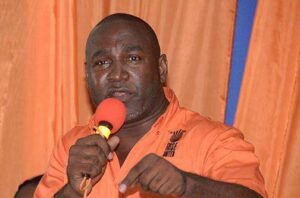Hope for Haiti
PJ sees possibility for the country to move out of crisis it now faces after recent developments
FORMER Prime Minister of Jamaica PJ Patterson is confident that recent proposed solutions to the crisis in Haiti can work and will offer that country the best chance of moving forward successfully.
“I think what they have proposed is logical [but] it is feasible only if the conditions on the ground allow for its implementation,” Patterson told the Jamaica Observer during an exclusive interview last Tuesday.
Following crisis talks in Kingston just over two weeks ago, it was announced that Haitian Prime Minister Ariel Henry would resign following the establishment of a transitional presidential council which will be responsible for naming an interim prime minister ahead of a national election to determine a new head of government.
“There is a very encouraging signal in that the parties mentioned in that agreement, save one, have already nominated someone to serve on the presidential council. Let us hope that the presidential council will be able to meet in reasonable time because that is necessary to put into effect the resignation of the prime minister which will be finalised when there is a constituted authority in place,” Patterson said hours before the council put out its first official statement in which it said as soon its members are officially installed, they would help “put Haiti back on the path of democratic legitimacy, stability and dignity”.
The talks in Kingston were led by Caribbean Community (Caricom) heads of government and included envoys from the United States, France, Canada, the United Nations and other major players. Patterson was pleased that the regional leaders are at the forefront of efforts to help Haiti through discussions with Haitians and the international community.
Haiti has been rocked by acute violence since the 2021 assassination of President Jovenel Moise. The crisis escalated late February when the country’s gangs launched a coordinated offensive, raiding a prison and releasing thousands of inmates as they demanded Henry’s resignation.
The political chaos and street violence are taking place against a backdrop of increasingly desperate hunger. Last week the United Nations reported that nearly five million people, almost half the Haitian population, faces “crisis or worse levels of acute food insecurity”.
Amid the sharply worsening conditions, more than 33,000 people have fled the capital Port-au-Prince where a state of emergency has been declared until April.
“Haiti is a member of Caricom, and Caricom has to demonstrate the will and the determination to help the most populous state in the region to achieve a level of democratic stability and economic development,” said Patterson, who retired from representation politics in March 2006 and is respected worldwide as an astute statesman.
“I brought Haiti into the Caribbean Community… and it was a calculated decision because Haiti deserves a very special place in the history of mankind [because] of its peculiar and unique significance in the struggle against slavery and the building of an independent State,” Patterson told the Sunday Observer.
“For that sin, they have paid an enormous price, beginning with the refusal of the developed world to recognise them as an independent country unless they paid France reparations for the slaves that had been freed,” he said.
He charged that the situation in Haiti has been predicated on the “extortion that France imposed and the repeated invasions by the United States of America, both of which have prevented Haiti from developing a free and democratic society”.
While pointing out that Haiti suffers from a lack of institutions both in Government and the political structure which has made it difficult to obtain a consensus on the way forward, Patterson said the international community has to play a major role in helping that country out of the present crisis.
“Like the World Bank, the IDB (Inter-American Development Bank), the IMF (International Monetary Fund), together with nations which have done the damage, USA, France and, by extension, the European Union, [and] Canada which has benefited from considerably from Haitian expertise, all have to come together,” said Patterson as he noted that several countries made promises of support for Haiti after the magnitude 7.0 earthquake of 2010 which devastated the country, but are yet to deliver.
According to Patterson, the next Haitian Government elected will need to look at changes to its constitution to make it more effective.
He said the new Government will also need to implement a programme for economic development to repair the damage that has been done in recent time and to plan for the full deployment of the human and capital resources needed for Haiti’s economic growth and development.
“That Government is also going to [need to] build some of the institutional capacity particularly pertaining to security and it has to decide whether it is going to restore an army to be able to assist the police force in dealing with law and order throughout the country, or whether it is going to create a police force of the size, the capacity, with the training to be able to maintain law and order,” said Patterson who further argued that, “It is in the interest of the entire hemisphere that Haiti is allowed to grow and develop and contribute to the welfare of the region.”












